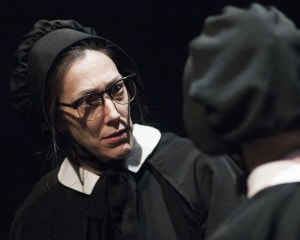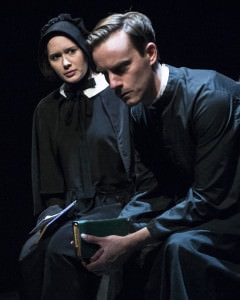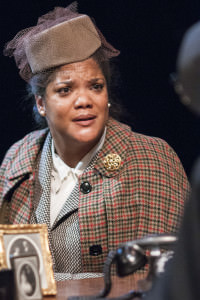No doubt you’ll recall Meryl Streep, Philip Seymour Hoffman, Viola Davis, and Amy Adams in the Hollywood 2008 adaptation of John Patrick Shanley’s Doubt, a Parable — simply titled Doubt and directed and adapted by the playwright himself. Perhaps that piquant memory is what gives you incentive to catch 1st Stage’s production of the 2005 Pulitzer- and Tony-winning play.

Ten minutes in, you’ll forget those A-list performances. 1st Stage’s four-person cast, with divine inspiration by Director Michael Dove, is as unlike their predecessors as King James’ is to Wycliffe’s Bible. And that’s the best reason to catch this superb reincarnation.
Even Streep might have learned a thing or two from Jessica Lefkow’s Sister Aloysius! Gospel truth.
Doubt, a Parable is the story of a priest who is accused by a headmistress nun of being a pedophile at a Bronx Catholic school in 1964. Or is it the story of an icy, bigoted nun, frustrated by her stained-glass ceiling, who targets a high-on-his-horse priest, who happens to be gay?
The answer, my friends, is blowing in the wind.
(Kudos, by the way, to Sound Designer Thomas Sowers for the windy scene wipes and other ambient flavors.)
I feel fortunate for the opportunity to review this show at a time when Pope Francis has not only turned the screws on bishops to face up to sex-abuse scandals and clean house but has driven the first nail into the church’s homophobic stance. Against this backdrop, the play takes on heightened meaning. Only a great script morphs so glutinously over time, retrofitting itself for eternal discussion.
The premise of uncertainty — did he or didn’t he? — is only the starting point for an investigation into how we know what we know. How the unknowable — or even the unspeakable — forces growth in seekers and witch hunters alike.
1st Stage invests the audience right off, calling us for service to the only church I know — a confessional theater — via the heavy strains of an asthmatic pipe organ. With lights dim, we imagine seeing it there, above the crucifix; this is by brilliant design of John Bowhers, whose set speaks volumes.
Bowhers uses planks of wood, arranged randomly but orderly, to evoke not only the hardened discipline beat into many Catholic school boys and girls but the injustice inflicted upon Jesus and other ancient “criminals” sentenced without a fair trial. It’s as if this wood, twisted with knots, bears witness to the twisted goings-on in the hygienic principal’s office, where Sister Aloysius speaks often about physical violence, though none is displayed and the battles are all internal. Lefkow elicits lines with razor-sharp diction and prescriptive precision. The heavy, retro, door with opaque glass, the modest tea station, the uncompromising wooden chairs … it almost smells old-school.
Along the side and in front of the stage are venues where clearer thinking occurs — the garden, the sanctuary, the gymnasium, the rectory. And what is it about “rectory,” anyway, the word? It alone whispers naughtiness.

As the pipe organ blasts on, the priest enters, takes his seat, waits for his cue. All rise? We notice right off that Rob Jansen’s Father Flynn is no Seymour Hoffman. There is nothing brash or scabrous about him. His sermonizing is not at all preachy; rather, he seems to be pleading with us, making his plea. And there’s something young and innocent about him. At first it’s jarring, not what you’d expect, having seen the movie. Then you realize the “innocence” the nuns later speak of — referring to the children or the senile or the unjaded — carries another meaning: the opposite of guilt. The wooden awning and stage transform suspiciously into a courtroom.
It suddenly dawns that the deep “conviction” of the clergy and the faithful — those who believe things without evidence, not seeing or hearing — also carries a double meaning. Conviction by trial, or error, as the case may be.
This play teases out thoughts and crystallizes truths like a cotton candy sieve tugging at tufts of sugar.
So we accept Flynn’s innocence this time around. Maybe. There he is, seizing Sister Aloysius’ chair when invited to sit down, as if he’s Father Superior. And after trying to charm the guileless Sister James to take his side in the scandal, he spits at a crow, annoyed and unatoned. His longish nails — are they a preference, a freak flag, a weapon to hold his own against the catty sister in their nails-out fight?
There are two sides to every character. We see Sister Aloysius tending to the rose bush, protecting it from frost as her own frosty demeanor all but evaporates. Lefkow wraps this sister’s rough edges in humor and smart charm, even as she mercilessly inflicts self-doubt onto sweet dumpling Sister James, or presses an impossibly blameless priest to confess all.

Then there’s Mrs. Muller, the mother of the priest’s purported victim, played with grace and gravity by Lolita Marie. Her short, stinging scene, like Davis’ in the movie, is the one that perplexes most, casting doubt on everything you thought you knew about equal opportunity and motherly love. With just two lines, Marie presses the tears button. Her defense of her son “being himself” sheds light on sacrifice and traces civil rights from the Sixties movement to the march of gay-marriage laws coast to coast.
Jenny Donovan’s Sister James is hardly dumb or docile; there IS a bit of a righteous diva lurking beneath. She is deliciously alive, with love pooling in her pores, but you wonder about her back story, and her future. The moral ambiguity of her superiors only raises her stature in our eyes. Among her most telling lines, spoken with pure conviction, is: “I don’t believe it.” A topsy-turvy, inverse belief.
The plot’s twists and turns dovetail into a tidy mess of human nature on display in a vestry/courtroom/war room. Who’s the victim here? Are we all victims of mortal judgment? Is this show about standing up to the church’s rigid precepts and intolerance? Or about chipping away at the crust of any public façade to expose each private crisis of identity?
And who am I to judge? My only criticisms, oh so slight: Lefkow’s starchy, singsongy accent veers occasionally into a Shakespearean realm; there’s no trace of da Bronx in any character. Donovan and Jansen become conspiratorial peers at one point — you wonder if they’ll kiss, driving the scandal in a whole new, wrong direction. And while costumes and vestments by Brittany Graham are believable — Mrs. Muller’s Sunday suit is especially nostalgic — the nun’s bonnets hide their faces in profile, restricting their range of expression like Muslims in niqabs, rather than nuns in habits. It was OK for the movie, but doesn’t work on stage.
Just two weeks from the Oscars, so many comparisons are at hand — how “the book was better” than the movie contenders. We hardly ever hear: “The play was better.” But I heard plenty of that as this audience filed out.
There might be a more transfixing show than this around town this season — but I doubt it.
Running Time: A brisk 90 minutes, with no intermission.
Doubt plays through March 1, 2015 at 1st Stage-1524 Spring Hill Road, in Tysons, VA — steps from the Silver Line’s Springhill metro stop. For tickets, call the box office at (703) 854-1856, or purchase them online.





